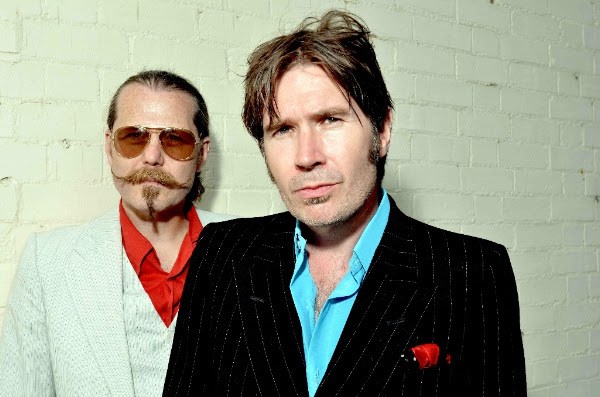Interview with Justin Currie and Iain Harvie from Del Amitri, originally published on delamitrinews.tumblr.com.
Last November Del Amitri surprised fans with the announcement of their long-awaited return to the stage – four years after their first UK dates for more than a decade. A hint about new material has appeared on their blog, but since they put the band on ice in 2002 the music industry has gone through drastic changes that have had huge repercussions for how music is now recorded and consumed.
In this exclusive interview for the Del Amitri Fans Facebook account and Twitter feed – run for the fans by fans – Justin Currie and Iain Harvie tell Rhiannon Law about the past, present and future of the band.
It’s an uncharacteristically balmy afternoon when I sit down with the two founding members of Del Amitri at Justin Currie’s Glasgow home. As both men get themselves settled – facing each other across a coffee table with mugs of coffee and a plate of rather delicious ginger biscuits – the beginning feels like the best place to start. So, what are their earliest memories of meeting each other? “The first two guitar players that I’d gone to school with had buggered off to university” explains Currie, recalling the need to recruit new members to the band, which had already played a dozen or more gigs by that point. That incarnation of Del Amitri had also put out the Happy Birthday/What She Calls It flexi-disc (alongside The Bluebells). Following an advert placed in McCormack’s music shop, the interview process began for anyone who could play anything.
“So for two weeks we just met all these really rubbish people,” says Currie of the many “deeply insecure” wannabe lead singers that approached him. “And then Iain came in and it was just a completely different ballgame – a proper person who was interested in music and really into writing as well.”
“I’d only been in school bands and bands that had played covers in social clubs,” recalls Harvie. “So I just had this perception that there was no way I was gonna get into this band because they were just so successful…but it was quite quickly shattered!”
Once the two bandmates have stopped laughing, Currie explains that the Del Amitri rehearsal space at the time was a small janitor’s flat in the basement of a Victorian school. They then moved into an even smaller room next door on the basis that they didn’t have to share it with anyone and could lock their gear up. Despite being the size of a toilet, it proved to be enough space to do the rehearsals for their first album.
“It was always key to us to have our own space because none of us really wrote songs separately,” says Currie. “We all wrote collectively and that was very time inefficient. There was a lot of time spent in rehearsal rooms just staring at each other going ‘do something!’ So, it was really important to have your own space rather than just renting a room once a week.”
Following the release of the first album – and due in some part to some arrested funds – the band took off on a self-funded tour of America. This is a concept that many young bands would be familiar with today, but something that was quite radical for the late 1980s. “The last money we had we spent on the air tickets, so we had no money in our pockets when we got there” recalls Currie.
I’m told that the plan was to become pen pals with fans in America and then enlist their help to put on gigs and to crash on their floors. “It was a kind of pre-internet social networking,” says Harvie. However, despite the best-laid plans of their manager at the time, the tour didn’t go quite to plan. “The first gig was a financial disaster” Currie admits, “we did the whole thing and we got round by basically begging and borrowing.”
Luckily that initial experience of touring didn’t put them off for life and our conversation quickly shifts from the past to the present. Del Amitri will shortly be heading out on their first UK tour since The A-Z of Us tour in 2014. “We really enjoyed 2014,” says Currie. “We didn’t know if we would enjoy it or not. We were very apprehensive about it, but we loved doing it. So we thought we’ll probably end up doing this again at some point and it just seemed like the right time. And we got offered the [Edinburgh] Castle again and we thought that’s quite tempting.”
The lack of an album to plug offered the band the chance to go on the road for the first time without the pressure of doing additional promotional work. Although Currie is quick to point out that promotion was always part of the job and something they were happy to do in the most part, he adds that the lack of this in 2014 was refreshing. “We’re getting paid to eat nicely catered food every day and play to really enthusiastic audiences and we don’t have to do anything else, we’re just doing the gigs. So that was a bit of a revelation, that this is great fun.”
When I ask if they still get nervous, or at least apprehensive, before shows, Currie responds almost instantly with an emphatic nod “yeah”, whereas Harvie smiles. “I never really got nervous particularly,” he says. “Even if things were going colossally wrong on stage, I’ve never really suffered from nerves. But maybe at The Hydro I was expecting to be quaking in my boots before we went on stage.”
Both bandmates concede that the size of the Glasgow venue, which has a 13,000 capacity, had potentially caused a few jitters. “I remember clearly going behind the stage at The Hydro and just thinking ‘who are all these people’?” exclaims Harvie. “There’s like hundreds of people. There are ambulance guys at these stadium shows and then there’s all the local crew and there might be like twenty of them all waiting to get the support band’s gear and then there are TV guys. So you come out of the dressing room and there are fifty people you’ve never seen before hanging around – all working. And they all kind of defer to you. They all just get out of your way and don’t make eye contact with you and you think ‘oh god this is weird’.”
But it was the response of the crowd at The Hydro that helped to calm any unease at the situation. “The audience all got up on their feet and they didn’t sit down,” says Currie “and that really helped us because we didn’t feel like we had to get them. They were just all over us from the start.”
Despite audiences clamouring for more after the 2014 tour, the band still express surprise at the reaction to the 2018 dates. “Oh, they’re still there!” Currie gives a little laugh but there is a hint of relief in his voice. The response from the fanbase to the tour announcement was to turn-out en masse, with many Edinburgh Castle tickets being sold on the first day of release.
“The weird thing is that people are so into going to these sorts of concerts now and we’re basically selling more tickets than we ever did really, it’s quite bizarre,” says Harvie. “We’re not going to do so many shows, but the venues that we’re playing at are big, if not bigger, than the venues we’d been to in 2002 when we stopped. It’s quite mad.”
I wonder aloud if this could be put down to the fact that fans are concerned that each tour may be their last opportunity to see Del Amitri live? “We never suggested in 2014 that we wouldn’t do it again because we didn’t really know” asserts Currie. “I mean it’s a possibility that we won’t do this again – it might not be feasible, we might not want to do it. For us, four years seemed like kinda the right amount of time. If it had been two years since The Hydro and all that sort of stuff it would have just felt a bit like we were trying to milk it.” He pauses for a few seconds before adding “Who knows what we’ll be doing in 5 or 10 years? Maybe we’ll all be dead!”
I mention that there has been a bit of criticism on social media regarding the prices for this tour, with some tickets costing £75. “Personally, I think that’s too much,” says Currie. “We don’t put on our own shows, we don’t have that kind of manpower. If we did we could control ticket prices. With the dawn of the music-is-free era, most bands main, or only, income is from live performance. I’ve watched ticket prices creep up, seemingly inexorably. I think that’s really unfair on those fans, like me, who still pay for their recorded music rather than streaming it all on YouTube. The most galling thing for me is the insultingly low fees that opening bands receive on my solo gigs especially. We will often subsidise that on a small scale to ensure we get the acts we want. That needs to change.”
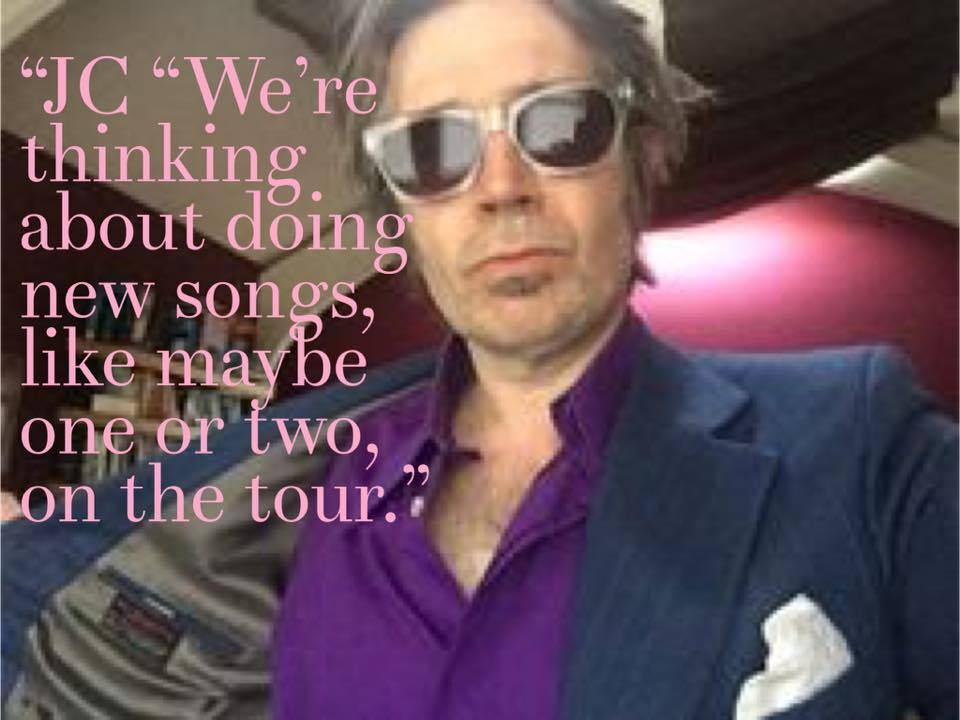
So, will we get to hear any new Del Amitri material on this year’s tour? Currie sounds positive in his response. “We’re thinking about doing new songs, like maybe one or two, on the tour.” However, he is more uncertain when it comes to the question of whether an album will follow. “We were sort of thinking about doing a record…we’re just humming and hawing about I guess.”
“We need to get back into the rehearsal room and get things moving again and see where that takes us” Harvie agrees.
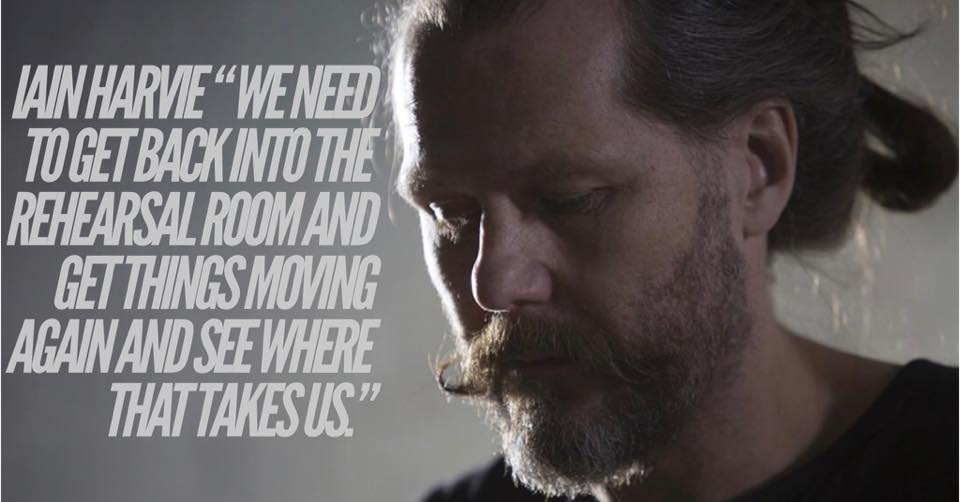
There nearly was a new record a while back, as it turns out. Harvie went to Currie with some ideas for an electronic album – something radically different to anything they had released before. “Iain at that time was into programming stuff and writing things on the computer and I thought it was a great idea,” says Currie. “We did a few writing trips and wrote a ton of stuff that we really liked, but there was never any great impetus behind it. Our manager didn’t particularly like it. It didn’t sound like anything Del Amitri had done before, but we thought it was Del Amitri because it was me and Iain writing all the tunes and it was all quite melodic.”
However, they were advised not to release it as a Del Amitri album and it is apparent that this caused them concern. “We just couldn’t see a way for Justin and I to release a record that wasn’t going to be a Del Amitri record” explains Harvie. Hearing them reflect on it now, it seems like the advice from their manager, John Reid, was sound. “I don’t think I was aware until after we stopped touring that Del Amitri had acquired a kind of identity that wasn’t necessarily my identity, or even our identity.” Harvie continues.
The electronic album would not only have potentially been a step too far away from the Del Amitri identity, but it would also have been released at a time when the music industry was in complete turmoil. Both agree that it would have been a crazy time to reinvent the band. However, it’s clear that they loved the material and when they talk about this unreleased music it’s as though they are still coming to terms with the fact it didn’t happen. “We really liked it. We were dead into it, you know.” Currie enthuses.
It’s Harvie that notes the difficulties it would have caused for future tours. “I think it would have been odd to do these shows now if we had gone off in another direction, which is why I think John was maybe quite astute.”
I note that adding an electro section to a Del Amitri set would be a tricky proposition from a practical point of view and Harvie agrees. “That would have been a bit rubbish,” he says, “as if we’re like Spinal Tap on a sort of jazz odyssey.”
So, they’ve avoided the potential pitfalls of releasing something radical at a time when they would have needed a big promotional machine working for them, but what do they think about the current trend of releasing crowdfunded music? “I’ve avoided raising money from a fanbase because to me that makes you, psychologically at least, beholden to their expectations and I think that’s quite dangerous,” explains Currie. “When Del Amitri made Change Everything I found it quite odd because for the first time ever we were making a record that had an audience expecting it out there. For me, that was a completely different way of thinking about what we were doing and I found that quite confusing. And I think I would find it quite confusing if a hundred people gave us an amount of money to make an album. I would be pretty sure what those hundred people would be expecting and I think that would limit us in where we felt like we could go.”
Harvie agrees “It seems a bit cheeky from our perspective to crowdfund a record. If you want to make a record, go and make a record and then sell it to me”. That said, both are quick to acknowledge that it can be a useful way for those starting out to get a project off the ground in this way.
Currie and Harvie have both had their own projects in the years between the pause button being pressed on Del Amitri and the 2014 and current tours. Currie has been making solo records for more than ten years, with his fourth album This Is My Kingdom Now released last year.
Harvie’s most public-facing work was a project called Aliens that he explains was done with a neighbour. However, what many people may be unaware of is that the majority of his time has been – and is being – spent on scored music. He did a masters in composition at the Guildhall School of Music and Drama in London and is now in the middle of doing a three-year doctoral level composition project at the Royal Conservatoire of Scotland. “I think it has given me quite a lot of insight into what we did in the past,” he says before Currie interjects with “Yeah, you don’t want that, insight” and laughs.
I’m keen to understand how they know when a song, or a riff, or just the seed of an idea is for Del Amitri or for something else. “Recently I went away on a wee writing trip on my own with a sort of Del Amitri head on, rather than a Justin Currie solo head on and it’s definitely really different,” says Currie “If you put yourself in the headspace of writing for a specific thing you will write different things. It’s quite odd.”
Harvie goes back to the idea of an identity that has been created. “It’s quite a coherent body of work and that’s kind of how people recognise the identity,” he says. “There is something in there that you can tune back into and refocus. We were probably doing it sort of subconsciously at the time.” Currie agrees, saying “We did try and do something different on every record but, as Iain’s saying, there was a sort of cultural expectation or framework around the band that we probably didn’t go outside of.”
With the tour fast approaching, I ask how they choose a set list from the substantial Del Amitri back catalogue. “It was kind of easy last time because the concept was The A-Z of Us, so we knew we were going to do at least something from the Chrysalis album and try to cover all bases. We don’t really have a concept this time.” Currie confesses.
“You can’t really get away with leaving certain things out,” Harvie acknowledges. ”And from our perspective, you might think ‘well nobody wants to hear that again’, but that’s not really the case. But that’s going back to that identity thing. Would it be Del Amitri if you didn’t do Kiss This Thing Goodbye or Always The Last To Know or Roll To Me or Nothing Ever Happens or Be My Downfall?”
There’s a bit of nervous laughter as they realise just how close the tour is and that the set list will soon have to be confirmed. “We’re feeling our way into how we make it different from 2014, but it is essentially still the same thing because we’re not selling a new record,” confirms Currie.
“There’s a few wacky ideas going around, but we can’t share them with you yet,” says Harvie, despite my best efforts to get some more detail. “Actually it did cross my mind that we could cover the new Abba song that nobody’s heard yet.” From the raucous laughter that follows his comment, I gather that an Abba medley is off the list.
There are many fans who will be hoping to hear some of their less well-known album tracks and b-sides on this tour. However, Currie is quick to note that they have a varied audience – many people may be coming to see them because they’ve got the greatest hits album or because they saw them once years ago and just fancy seeing them again. “You’ve just got to be aware that you don’t want to be being too specialist,” he says. “Commercial success creates expectations and you need to be really smart to subvert them and get away with it.” Both agree that a venue like Edinburgh Castle would not be the place to try to do that, although there is a hint that the Barrowlands dates may provide the opportunity to do something a bit different.
Despite their achievements, Del Amitri have always maintained they were “never hip”. I’m interested to know if that has helped them to return to the stage. “If you’re never relevant, you can’t suddenly become irrelevant! Yeah, I think that’s absolutely true” Currie agrees. “And also, if you’re not selling yourself on some sort of cutting edge hip thing then age is slightly kinder on you as well, to a certain extent.”
“It sounds an odd thing to say but we did want to make timeless rock and roll,” says Harvie. “What a dreadful cliché, but we were very much in that idiom where it was two guitars, bass and drums. It was a totally classic format. We were deliberately trying to be not of the time. We didn’t perceive it necessarily as being retro or being timeless…I wish I hadn’t used that word, but I think it’s probably the right word.”
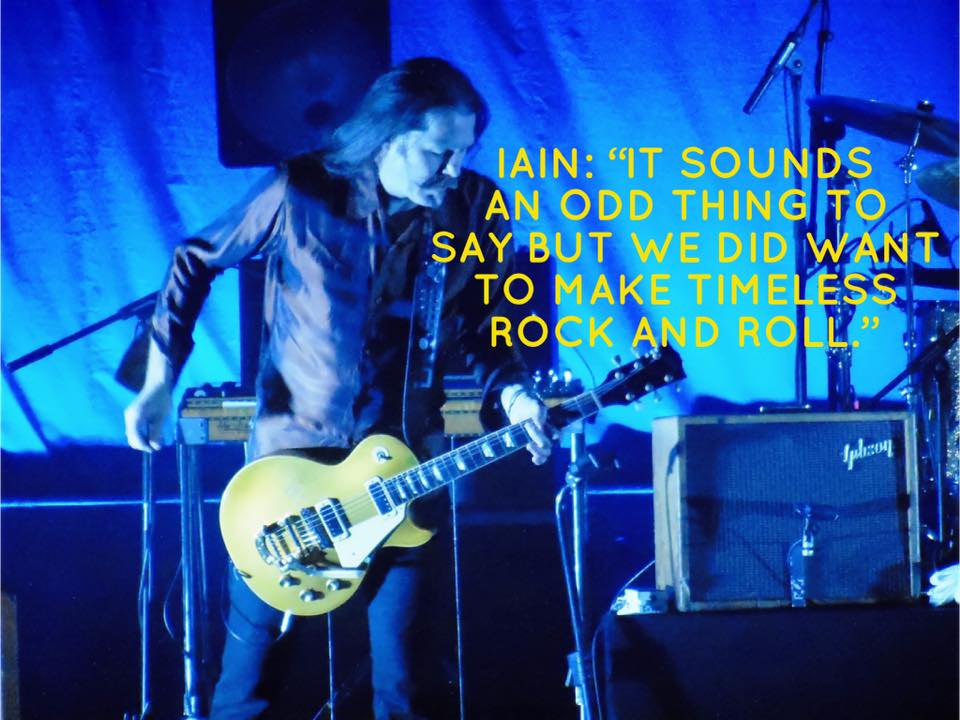
Staying true to this format has meant that the band has had to stick to their guns over the years, particularly during the making of Waking Hours when there was pressure to go against their ethos and use lots of shiny new production techniques. “It was quite a brave thing to do at the time,” Harvie says. “It does put us in a position now where we can do exactly the same thing and it still sounds right, which isn’t the case if you’d got into that whole 80s production thing.”
While the band has been away there has been plenty of Del Amitri related activity – organised, mostly, by the fanbase. The Pasted Beyond Recognition Del Amitri covers album and concert raised thousands of pounds for Spina Bifida Hydrocephalus Scotland. Harvie notes that he really enjoyed the concert and “found the whole thing quite touching.”
There is also the forthcoming book These Are Such Perfect Days: The Del Amitri Story by Charles Rawlings-Way. “We gave him as many contacts as we could and then electronically introduced him to people that would be relevant, to be part of the story,” says Currie. “I’m really chuffed that he’s done it and it feels like all that information is of no great import and the story is of no great import, but at least it’s all in one place and, having read it, it’s all true”.
“It’s interesting in that he started off with a specific thesis about the band that he thought would make a good book but in the process of talking to everybody that thesis sort of reversed” Currie continues. “I like that. I like that we confounded him.”
Currie also notes that, coincidentally, the Rip It Up exhibition at the National Museum of Scotland in Edinburgh is also opening on the 22nd June and some Del Amitri memorabilia will feature, including a tartan guitar. “We don’t have a record and we’ve never intended on having a record, but there’s other things happening so it makes you feel like there’s a reason to be doing everything this year,” he says.
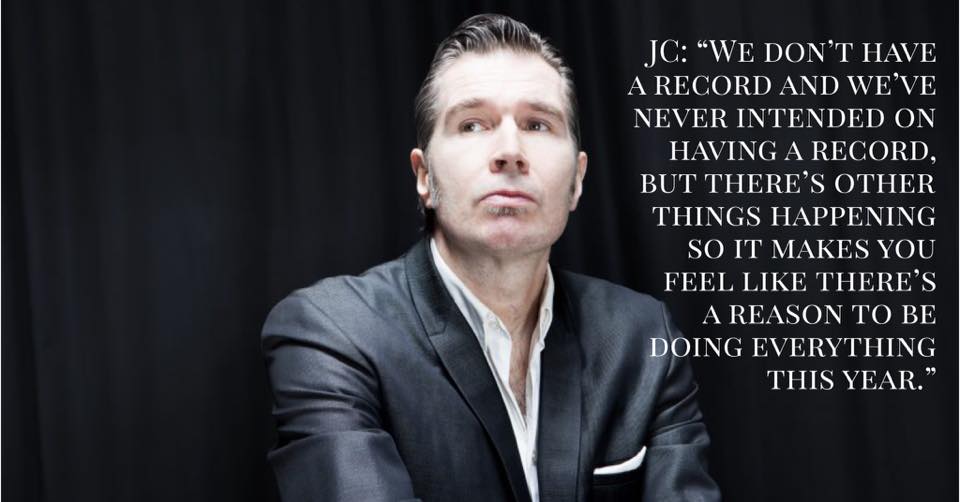
To conclude our conversation before the coffee runs dry and the biscuits are just crumbs, I ask the question that I know they will be dreading: what does the future hold for Del Amitri? “We’re trying to write new songs and we’ll see where that goes,” Currie confirms. “I don’t think we ever thought we made a killer album. There was always something slightly wrong with every album, in some cases more than others. There were better songs on albums that didn’t sound as good as other albums that had worse songs on them and that kind of thing. So there’s an opportunity there to try and rectify that, but if we didn’t feel like we were getting close to rectifying that I don’t think we would put anything out.”
“We’ve never had to do anything in a world where people don’t actually buy music!” Harvie exclaims. “But that’s quite interesting because it changes things. In 2002 the change [in the music industry] was perceived as being brutal and negative, but I don’t know if it necessarily has been in the long run. In a sense, we’re kind of feeling our way back into that and seeing if we might be able to do something useful.”
The music industry has changed. The way people consume music has changed. The concept of an album has changed – Harvie calls it a “romantic idea” and “slightly ludicrous” in the current climate. So what does the future hold for Del Amitri beyond the tour? “We’re going to reinvent the music business in our own image in an effort to preserve the identity of Del Amitri,” says Harvie with a playful smile.
A lot may have changed since the band took their extended break, but talking with them today the enthusiasm for playing their music obviously remains and the excitement for the forthcoming tour is clear. Whatever the future may hold, for the time being, Del Amitri are a band very much focussed on the here and now.

